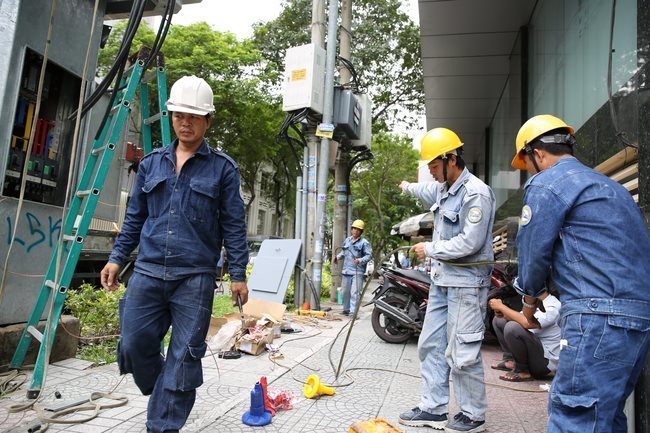 |
| Workers fix power lines in HCMC. The recent electricity and gasoline price hikes have sent production costs and consumer goods prices soaring |
A Cabinet member said in a report at a meeting of the NA Standing Committee on May 8 that the average CPI in the first four months rose 2.71% from a year earlier, the lowest in three years.
The Ministry of Industry and Trade also said in its report released on the same day that the hikes in gasoline and electricity prices had caused knock-on effects on consumer prices in the four-month period.
However, the effects of African swine fever on the psychology of consumers, and the adoption of a flexible monetary policy for macroeconomic stability helped rein in inflation.
The CPI in April inched up 0.31% month-on-month, and as a result, the average CPI in the first four months expanded 2.71% over the same period last year.
According to the ministry, essential goods in April did not see abnormal fluctuations, despite being affected by the prices of raw materials on the global market, diseases and various seasonal factors. However, the supply and demand of these products were still guaranteed.
Prices of steel and cement products, which were revised upward in March following the 8.36% hike in electricity prices, effective March 30, were kept unchanged in April. The prices of fresh food products tended to be stable as well.
The ministry pointed out that the total retail sales of goods and services in April rose by 2.3% from a month earlier to reach roughly VND400 trillion.
The groups of household appliances, lodging and catering services and travel services were up 2%-3.1% as the month was a transition period heading into the hot season, leading to the rising demand for cooling equipment and tourism, hotel and catering services on the occasions of the Hung Kings’ Death Anniversary; Reunification Day, April 30; and International Labor Day, May 1.
In the year up to April, retail sales of goods and services had reached their highest level of an estimated VND1.583 quadrillion since 2015, up 11.9% over the same period last year, if a 9% rise in the price factor is excluded.
The Government said in the report that the inflation pressure for 2019 would not be too high since world commodity prices are forecast to stay below the levels seen in 2018 and global demand is unlikely to see a sudden increase, even if trade tensions between China and the United States intensify.
However, head the NA Economic Committee Vu Hong Thanh said that the core inflation in the first four months reached 1.84%, exceeding the 2019 target of between 1.6% and 1.8%.
Thanh noted that the prices of many public services and essential goods, such as electricity and gasoline, which were revised upward for the last two consecutive months, would put great pressure on inflation in the rest of the year.
Also, food prices are likely to see significant increases as pork supplies are dwindling due to the fallout from African swine fever.
The recent hikes in electricity and gasoline prices have driven up input costs for many manufacturing industries. For example, according to the Ministry of Industry and Trade, these adjustments forced steelmakers to raise the prices of their products by VND100,000-VND200,000 per ton in April.
The official suggested the Government assess and report more fully on the increases in electricity and gasoline prices, as well as the effects of price increases on the CPI and manufacturing sector.
While State utility Vietnam Electricity Group reported an 8.36% rise in the average retail price of electricity, an official of the Electricity Regulatory Authority of Vietnam said that there was a 30% hike last month, according to Thanh.
He said the outcry has prompted the Government to order a review of the electricity price hike.
The Government is striving to keep inflation under 4% for this year. Last year witnessed an inflation rate of 3.54%. SGT
 While the Government has announced the CPI in January-April was at its lowest level in three years, the National Assembly (NA) Economic Committee has voiced concern over the possible recurrence of high inflation.
While the Government has announced the CPI in January-April was at its lowest level in three years, the National Assembly (NA) Economic Committee has voiced concern over the possible recurrence of high inflation.